Commissioner Jen Ahearn-Koch reflects on how last year’s storm season impacted her personally.
By Oscar Moore
Original Air Date: July 25, 2025
Host: Last storm season was difficult for Sarasota residents—but not just regular residents. Up now, an interview with Sarasota City Commissioner Jen Ahearn-Koch about 2024’s historic flooding and her own experience of being flooded. Oscar Moore reports.
Oscar Moore: The night of September 26 was memorable for Sarasota City Commissioner Jen Ahearn-Koch.
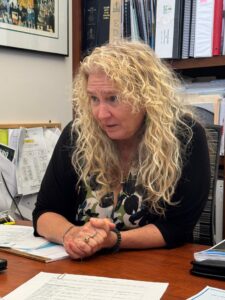
Jen Ahearn-Koch
JAK: I wasn’t super concerned about it. And that was the storm surge one. And that’s when I heard the electricity went out. It was nighttime, and the electricity went out. I couldn’t see, but I could hear the cars and trucks going down the street, and I heard this truck going down the street, and it made—like it’s going through a puddle—”shhhh!”—and then there was—therets a low spot on that street where you typically hear a car going through a puddle, but then it goes back up again. And it kept going “shhhh!” all the way down. And I thought, “This is not good.” Then I looked outside, and the water was a quarter of an inch below our door.
So we rushed around the house and tried to stop it with duct tape and plastic bags and rugs and blankets, and you shove them under the cracks of the doors, and I had no idea how high it was going to go or what was going to happen. It wasn’t happening quickly. It wasn’t like a wave—like a tsunami. It was just slowly rising. Then it started to come into the house. I had a small garbage pail, and I was taking the water and trying to put it into the bathtub, thinking I could scoop it out. I don’t know—just trying to do something.
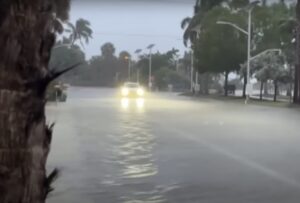 OM: She had to throw out many family belongings.
OM: She had to throw out many family belongings.
JAK: The hardest part was going through stuff, like boxes that I had of my kids’ drawing—when they were in school, and their paperwork, and they would make—when you’re in school and you’re little, you make your mom or your dad Father’s Day cards and Mother’s Day cards and birthday cards, and you do them drawings, and your parents save special funny notes that you wrote when you were little and things like that. And you can’t paste it up all over the house. Eventually, it ends up in a box. AThat’s the kind of stuff that was really hard to go through. And from their grandparents and from their great aunt and uncle in Germany, and a lot of stuff had to be thrown away, and it was extremely sad—books that they gave them and would write in there, [???] and “Oma and Opa”—all that kind of stuff—and you open it up and it’s—the water’s toxic.
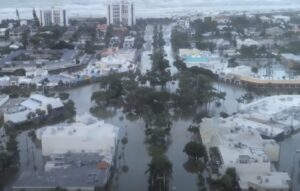
St. Armands Key, flooded after Hurricane Helene.
OM: Ahearn-Koch and her husband are not even finished restoring their home.
JAK: Our house is still not back together 10 months later. We just got our permit signed off on for the inside of the house, so we have doors and walls now and our floor. Our kitchen—we have to go through the whole permitting process, so we only have a fridge and a partially functioning stove and oven and a sink. And that’s considered a kitchen, so we are allowed to live there—because you still need a kitchen to live there—but we don’t have cabinets and a lot of other stuff. That’s fine, though.
OM: When asked how the city was planning on helping prevent major flooding in the future, Ahearn said the city does not have its own stormwater management department. The county is in charge of this.
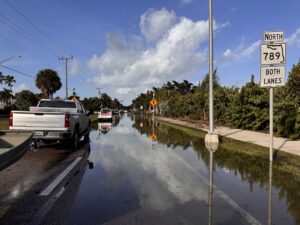
St. Armands, flooded in the aftermath of Hurricane Helene.
JAK: The county commissioners right now are revamping the entire way they’re dealing with stormwater—not only the department but the dollars that taxpayers pay, how they’re spent, where they’ve been spent, why has maintenance not been had throughout the entire system and, going forward, where they can best spend those dollars. We don’t manage it. The city doesn’t. The county does that for us.
But we are in conversation with the county commissioners. We talk with them very often about this, and what was going to happen was that there was conversation that they would give the stormwater system back to the city of Sarasota and say, “Okay, now you get to manage your own stormwater system,” which would have put us in a very, very bad position. But the county commissioners have reconsidered. They took a vote to say, “We won’t discuss that, at least for a year. We want to do a comprehensive assessment of all of our stormwater, how it works throughout the entire county, including the city of Sarasota and other cities. How can we better spend the money? How can we get it upgraded to where it needs to be? Because it’s not functioning. We know that for sure.”
OM: Hard choices are ahead. The city has limited resources, but saving lives is on the top of the commissioners’ mind.
JAK: We have limited resources and limited time. We have to focus on the things that are our priorities. For the human safety issue, it’s the islands for the city of Sarasota at this point in time. But there are many others.
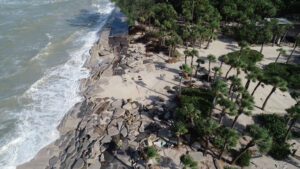
Casey Key Road in the aftermath of Hurricane Helene. Photo via Sarasota County (@srqcountygov) on Instagram.
OM: And back to her personal experience, it wasn’t easy for the elected official to get a permit for the city’s building department. She has some advice.
JAK: That’s a really good question, because IIve never had to do that before. When something like this happens, you can hire a general contractor to do these things for you, and then you pay them a certain amount of money, but because we weren’t alone in all these three hurricanes and needing general contractors and people to do doors and walls and floors and all that stuff, I had to do it myself. It was a lot of work. But I went to the permitting department, and they said the biggest mistake everyone makes is—we ask for all these things, and they think, “Oh, they don’t really need that one,” or “Ehh, I’ll give them what I know, and I don’t have to give them all that information,” or, “It’s incomplete.” And they said, “Don’t do that. Fill out everything. Give us everything we’re asking for, and it’ll happen very quickly.” So I put a lot of time into doing that—reading all the questions, giving them everything they wanted—and that paid off, because they got my application, and it just went right through.
OM: This has been Oscar Moore reporting for WSLR News.
Oscar Moore is a high school sophomore and one of the participants in the WSLR News Intensive summer camp.
WSLR News aims to keep the local community informed with our 1/2 hour local news show, quarterly newspaper and social media feeds. The local news broadcast airs on Wednesdays and Fridays at 6pm.